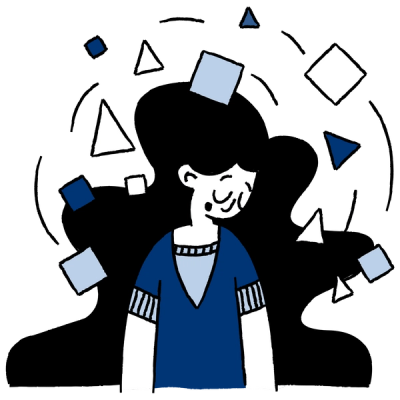Types of grief
We can experience grief before, during, and after any type of loss and in many different ways. Sometimes, your thoughts and feelings will be expected and make sense. Other times, you might be surprised by how intense your response is or how unexpected your feelings are. In some cases, you might even feel like you don’t really have the right to grieve.
No matter what type of loss you’ve experienced or how intense your emotions might feel, your grief is valid and you’re allowed to process your loss however feels right for you.
Try not to compare yourself to the way others grieve or what society might tell you about grieving. Remember, there is no right or wrong way to process your loss.
Below, you can read more about different types of grief.
Disenfranchised grief
Disenfranchised grief happens when your loss isn’t openly recognised or supported by others.
For example, you might feel this way when grieving something that happened during childhood, a miscarriage, a short-term relationship, a pet, or the loss of purpose after retiring.
It can be difficult when you feel like your grief isn’t acknowledged or validated by society.
Anticipatory grief
Anticipatory grief is the grief you feel before a loss actually happens.
For example, if you or someone you care about gets a serious injury or illness, you might start grieving future health challenges or changes to daily life even before the loss occurs.
Similarly, you might experience anticipatory grief when facing major life changes like an impending divorce or separation. It’s a way of preparing for and dealing with the emotional impact of the anticipated loss.
Collective grief
Collective grief is the shared sadness experienced by many people affected by the same event.
For example, many people felt collective grief during and after the COVID-19 pandemic because of the loss of lives, loss of financial security, and loss of social connections.
Collective grief is commonly experienced after natural disasters or distressing public events.
Complicated grief
Complicated grief (sometimes called prolonged or complex grief) is when your feelings of grief are very intense and last for a long time.
If you are experiencing complicated grief, you might feel hopeless about the future, lonely, depressed, or experience thoughts of suicide. This type of grief can make it hard to handle everyday activities and responsibilities.
What’s the difference between complicated grief and depression?
Complicated grief is intense sadness that lasts a long time after a loss, making it hard to cope and move forward.
Depression is a broader mental health challenge that affects your mood, energy, and daily life and isn’t always connected to a specific loss or event.
While complicated grief is focused on a specific loss, depression affects various aspects of your life and can occur without a clear reason.
You can learn more about the feelings and effects of depression in our depression topic.
Traumatic grief
While trauma is the emotional and psychological impact of a deeply distressing event, traumatic grief is a response to a sudden or unexpected loss. This might be the result of losing a child, experiencing the suicide death of a loved one, or even losing a vital support system due to something like a natural disaster.
Unlike the grief that may come from an expected loss, such as after a long illness, traumatic grief can feel more intense, overwhelming, and disorienting. That doesn’t mean other forms of grief are any less painful - grief is always hard.
For some, traumatic grief can lead to complicated grief, making it especially important to seek support when needed.
Ecological grief
Ecological grief is the deep sadness and emotional pain people feel when they witness or anticipate the loss of ecosystems, species, or landscapes due to environmental changes like deforestation, habitat destruction, climate change, extreme weather, and natural disasters.
It can bring up feelings of helplessness, anger, anxiety, and despair and is often associated with anticipatory or disenfranchised grief.
If you or someone you care about has experienced a natural disaster, you can find mental health support and preparedness tips in our natural disasters topic.
No matter what type of grief, Lifeline is here for you.
No matter what you’re going through, there are people who want to help.
You can contact Lifeline 24 hours a day, 7 days a week via 13 11 14, text, and chat.







